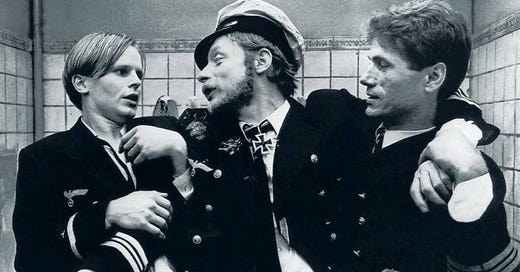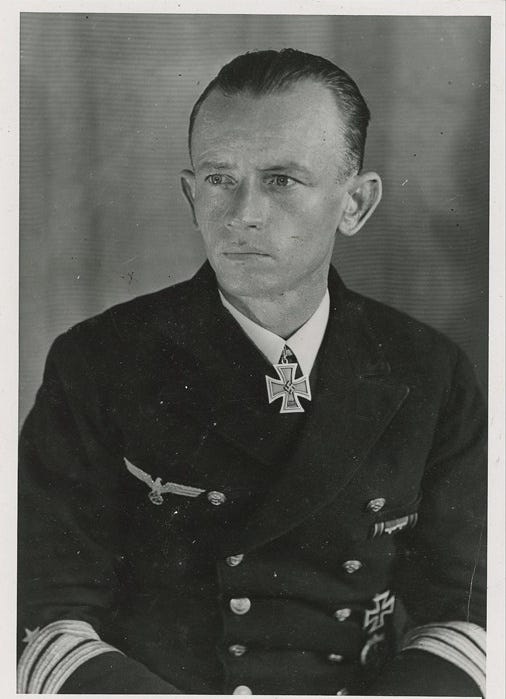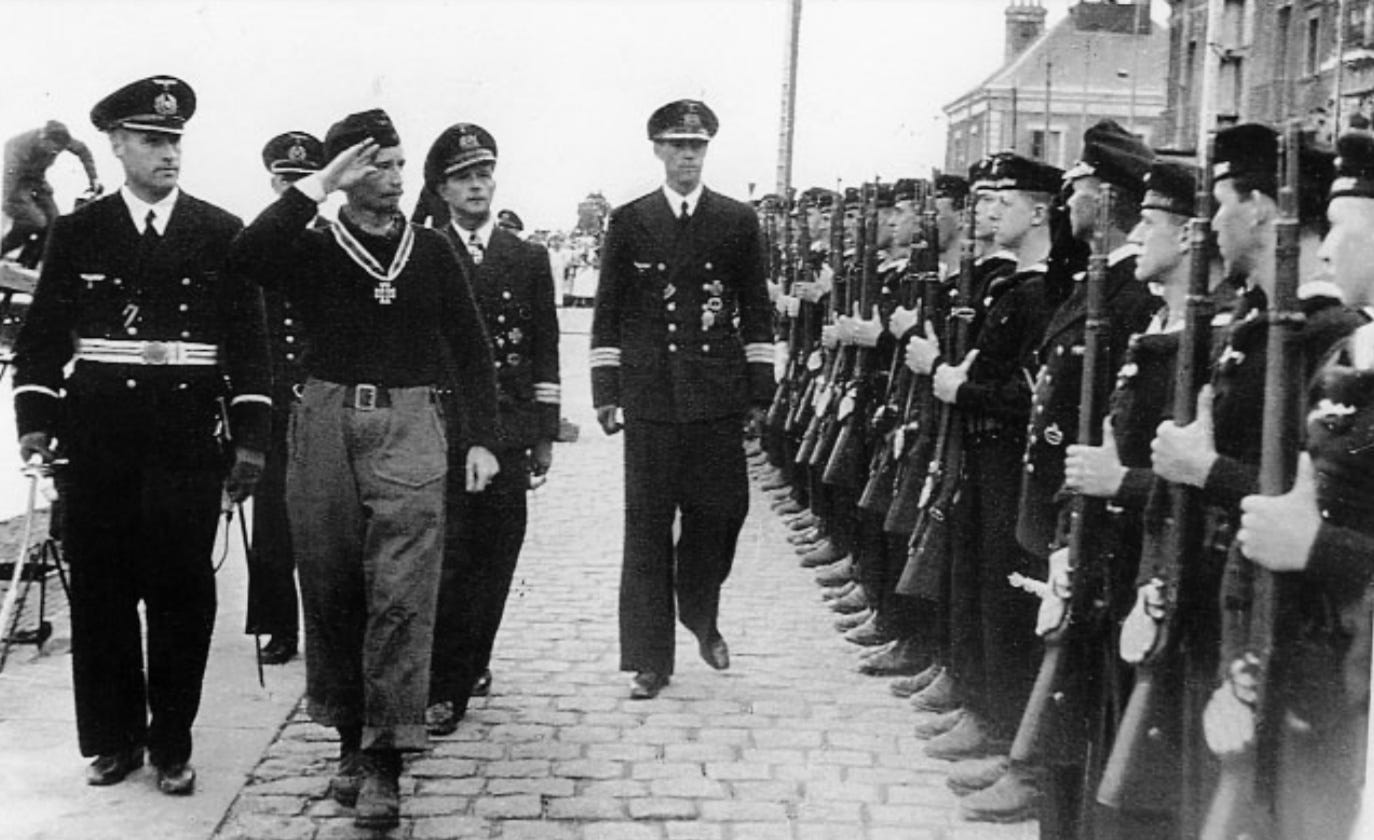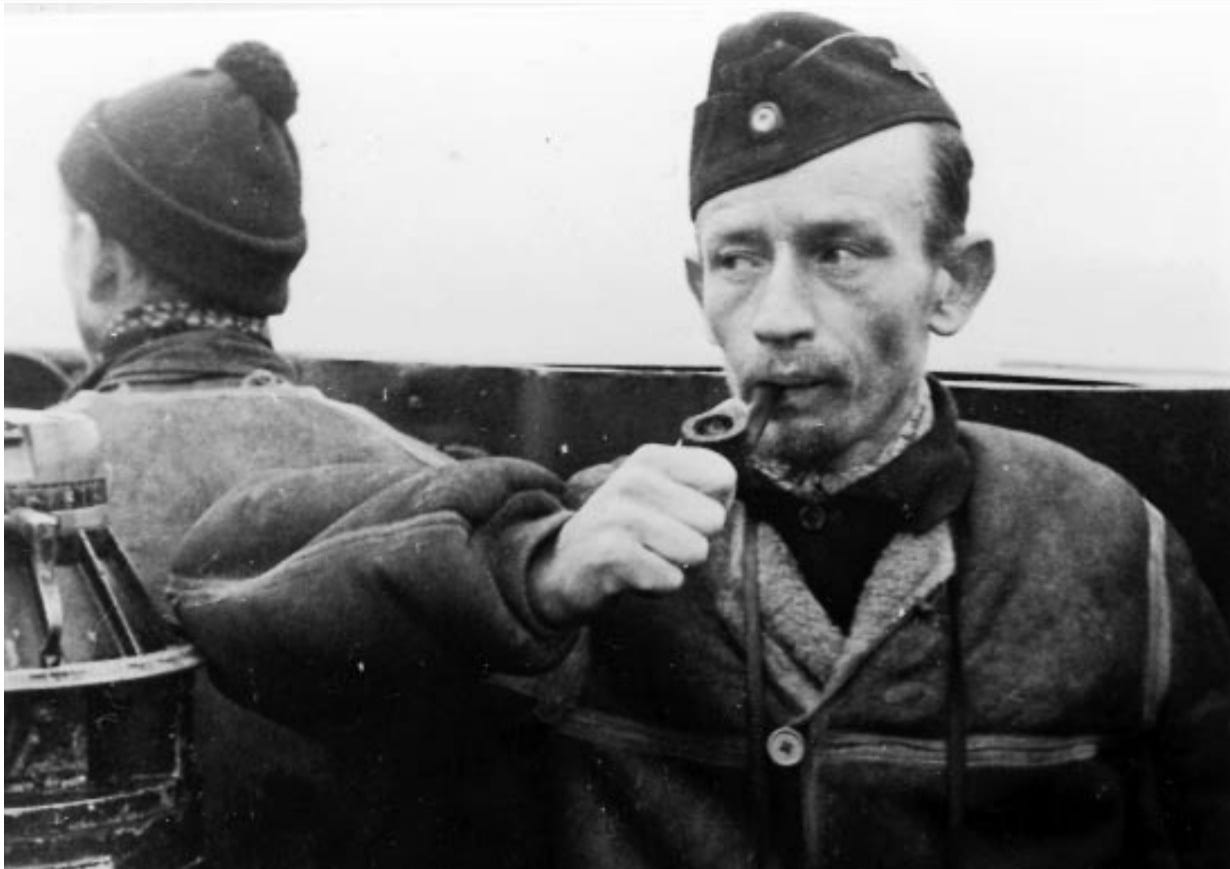‘I am not in the condition to f**k! Sehr gut! Sieg Heil! - Philipp Thomsen, ‘Das Boot’ [movie adaption]
‘As usual, Trumann is dead drunk. His spiky mop of black hair is covered with a drift of cigarette ash. Three or four butts have become entangled in it. One is still smoldering. He may burst into flames at any moment. He wears his Ritterkreuz astern, back to front: He calls it ‘Kiel collar’ his ‘Iron Collar from Kiel.’ - L.G. Buchheim ‘Das Boot’.
THE REAL PHILIP THOMSEN
Korvettenkapitän Karl Thurmann (4 September 1909 – 28 January 1943) is one of the lesser known u-boat commanders of the Kriegsmarine, whose name is not often mentioned in publications on submarine warfare in the Second World War. On the other hand however, he is probably also most famous and commonly known U-Boat commander of them all, due to the fact that author Lothar-Günther Buchheim, who got to know Thurmann during his own wartime service as a war correspondent, portrayed him in his famous novel ‘Das Boot’ as the stubborn and rather unconventional fictitious commander Kapitänleutnant ‘Trumann’.
Karl Thurmann was born on 4 September 1909 in Mülheim an der Ruhr. His parents were the postal inspector Emil Thurmann, born on 2 November 1873 in Wiesbaden, died on 30 September 1929 in Elberfeld, and Elsa Schellenberg, born on 8 February 1879 in Wiesbaden, still traceable in Wuppertal-Elberfeld until 1942. In 1910, the family lived in Mülheim at Goethestraße 10, although the last address was Kampstraße 49, when the father was already a postal councillor. In 1924, Emil Thurmann became chief postmaster and was appointed head of the office in Elberfeld, now a district of Wuppertal, a post he held until his death. In July 1924, the family therefore moved to Elberfeld. In Easter 1928, Karl Thurmann passed his school-leaving examinations at the Städtisches Realgymnasium [grammar school] in Elberfeld. He decided to become an officer in the Reichsmarine which he joined as a recruit on 1 April 1928, becoming a member of training ‘Crew 28’, next to Walter Flachsenberg (U-71), Eitel-Friedrich Kentrat, who holds the record for the longest U-Boat patrol (U-196, 225 days) of the war, Hans Meckel (U-3, U-19), Hans-Joachim Rahmlow (U-58, U-570), who as commander of U 570 surrendered south of Iceland after an attack by the British air force and Herbert Sohler (U-10, U-46) and Hannes Weingaertner (U-16, U-851).
In 1929, the year in which Thurmann’s father passed away, he was part of the crew of the light cruiser and training ship ‘Emden’ which between 5 December 1928 to 13 December 1929 was out on a long cruise which led it through the Mediterranean, through the Suez Canal into the Pacific, to Indonesia, Australia and to the west coast of the United States and central America before heading back into the Atlantic via the Panama Canal. Commander of the Emden at the time being the legendary Fregattenkapitän Lothar von Arnauld de la Perière, who during the First World War had become the most successful U-Boat commander in history.
By 1937, now Kapitänleutnant Thurmann, could already look back on a successful, professional career having served on several great vessels of the Reichsmarine, including the surveying ship ‘Meteor’, the light cruiser ‘Emden’ and - most important - Germany’s most modern warship, the famous heavy-cruiser ‘Deutschland’. After the Nazis seizure of power in Germany, we find a first ‘hint’ about Thurmann’s character in his personal records, which show that he took part in an ‘NS-Schulung’ (national socialist training) in Bad Tolz in Bavaria. It is well possible that this was the new ruler’s first attempt to administer ideological training to the unruly sea dog. As ‘Kommandanten-Schüler’ (trainee commander), a so-called ‘Konfirmand’ (confirmee), Thurmann took part in the final operation of U-29 under Otto Schuhart in the North Atlantic. On 17 September 1939 Schuhart had sunk the British aircraft carrier HMS Courageous in the Irish Sea. On 23 December 1940, took command of his own boat at the Blohm & Voss shipyard in Hamburg. It would be this Type VIIC boat, U-553, on which he would perish a few years later.
During its wartime service U-553 operated as a so-called ‘Gruppen U-Boot’ in the U-Boat-Lines ‘Bosemüller’, ‘Draufgänger’, ‘Kurfürst’, ‘Landsknecht’, ‘Panzer’, ‘Pirat’ ‘Wolf’ und ‘York’ and it is known that it engaged with several major convoys, with an area of operations spanning from Caribbean to the North American coast, across the entirety of the North Atlantic to the Faroe Islands and Newfoundland. During his combined Feindfahrten, or operations against the enemy, the longest of which lasted 67 days, Thurmann claimed 105609 tons of enemy merchant shipping (18 merchant vessels sunk).
A special kind of character
German naval historian Bodo Herzog, a relative of Thurmann, once stated that: “In the family he [Thurmann] was known as a very cheerful person. When he had fallen some said that he had fallen victim to his personal lifestyle. As rumour has it, the term ‘KZ’ (concentration camp) was dropped.’ Today we know that Thurmann had indeed been killed in action, but the rumours circulating in his family, claiming that maybe be had ended up in a concentration camp due to his unruly ‘lifestyle’, speak volumes about the man and it certainly is remarkable that his name hardly ever found mention in official and unofficial histories and personal memoirs of the U-Boat war. Another, very popular anecdote was handed down in several versions and by several authors, including the ‘Red Devil’ U-Boat ace Erich Topp in his autobiography ‘Fackeln uber dem Atlantik’. It involves Thurmann, his friend Werner Hartenstein (commander of U-156) and none other than the BdU, the commander of U-Boats, Admiral Karl Dönitz - a popular anecdote it was often retold. Thurmann and Hartenstein had both just returned from successful operations and made their report to Dönitz, who was rather enamoured by all this, and asked ‘is there anything I can do for you Hartenstein?’ - ‘Herr Admiral, we would like to have a look at Paris and would like to ask you for a car.’ Looking at the precarious fuel supply situation of those days, that was an exceptional thing to ask for. The Admiral agreed and offered them his personal car and his driver. All that had taken place in the morning hours. Later in the evening Dönitz requested his car, as he intended to pay a visit to the commander of the Wehrmacht in Paris. His Mercedes Limousine however, could not be found. So he asked his Flaggleutnant (flag lieutenant) for the whereabouts of his vehicle. ‘Herr Admiral has allocated the car to the two U-Boat commanders this morning.’ That wasn’t unknown to him, replied the General, but he had been under the impression that 4 hours would be enough to get to know Paris. His two commanders however had had other plans and the Admiral, forced to use an old and battered Army Opel to pay his visit, requested that both commanders were to report to him as soon as they had returned.
The night passed and morning broke. Hours which Thurmann and Hartenstein had indeed used to explore Paris by night. On the Rue de Liège [No.3 - location of the famous Kriegsmarine haunt, the ‘Sheherazade’ Night Club] they had met other U-Boat commanders as well as some Luftwaffe fighter pilots from the Channel coast, had lost the time and it had all ended in drunken revelry. Arriving back at the headquarters of the BdU the two very drunk U-Boat commanders ran into the Admiral’s Flaggleutnant who gave them a proper broadside, during which Thurmann passed out. Hartenstein, who also listed heavily to the side, pushed past the Flaggleutnant with the call ‘If my commander calls me, I will be there!’, swaying towards the Admirals office, knocking against the door and shouting ‘Kptlt. Hartenstein obediently at your service!’. Dönitz gave him a sharp reprimand and muttered something about offering someone an inch and having a mile taken from him. Hartenstein attempted to snap to attention and replied: ‘Vowing I have laid my hand on many flag during this terrible war and under many an Admiral I have served’ (quoting losely from the Ballads of the German writer Borries von Münchhausen), turned around and left the Admiral standing. Dönitz didn’t bear any grudges and humorously spoke about the episode at breakfast the following morning.
The writer and former war correspondent Lothar Günther Buchheim, who knew Thurmann personally, immortalised him in the novel ‘Das Boot’ in the character of the ‘crazy Trumann’. Wolfgang Petersen, the director of the cineastic permutation of Buchheim’s bestseller, merged Trumann with another character of the novel, Thomsen, into the single character of Philip Thomsen, so masterfully portrayed by the late actor Otto Sander.
‘Cowardly bastards!” Trumann growls, then rises laboriously and staggers off between the tables. He returns with a toilet brush in his hand. “What the hell’s that thing for?” the Old Man bursts out. But Trumann only staggers closer. He places himself in front of Thomsen with his left hand propped on our table, breathes deeply a couple of times, and at the top of his voice roars, “Silence in the cathouse!” Instantly the music stops. Trumann moves the dripping toilet brush up and down right in front of Thomsen’s face and babbles tearfully, “Our magnificent, esteemed, abstinent, and unwed Führer, who in his glorious ascension from painter’s apprentice to the greatest battle-leader of all time… is something wrong?” Trumann wallows for a few seconds in boozy emotion before going on to declare, “The great naval expert, the unexcelled ocean strategist, to whom it has occurred in his infinite wisdom… how does it go from there?” Trumann throws a questioning glance around the circle, belches deeply, and starts up again. “The great naval leader who showed that English bedwetter, that cigar-smoking syphilitic… ha, what else has he dreamed up? Let’s see… has shown that asshole of a Churchill just who knows which end is up!” Trumann lets himself sink back into his chair exhausted, and blows his Cognac breath straight into my face. In the bad light he looks green. “…we dub him knight—we consecrate the new knight! The shitty clown and the shitty Churchill!”
One can learn a lot about Thurmann’s character when looking at U-553s 7th patrol, which started on 19 April 1942. It stands out because Thurmann, without orders and on his own initiative, without having the correct maps or sailing directions, entered the Gulf of Saint Lawrence, traversing - often not submerged - the outlet of the North American Great Lakes via the Saint Lawrence River into the Atlantic Ocean. On 3 May 1943 he stood south of the Newfoundland Banks. This daring feat has been rightfully compared to Prien’s entering of Scapa Flow in October 1939. U-553 sank three merchant vessels with a combined tonnage of 16995 tons, but even more important than that, it had carried the war to the doorstep of the United States. A feat of invaluable propaganda value.
While on patrol on 24 August 1942, Thurmann learned that he had been awarded the Knight’s Cross of the Iron Cross, which he received in person, from the commander of 7. U-Flottille Sohler, on 17 September 1942. The photos taken during the award ceremony are telling in their own respect. On them, we see a rather unmilitaristically dressed Thurmann inspecting the troops of the naval company assembled in his honour. Everything about Thurmann’s dress code is against regulations. He is still wearing his U-boat leather trousers, the legs rolled up over his heavy naval boots and instead of his white commandants hat, he is wearing a battered forage cap. In addition he has done away with his regular uniform tunic and is wearing a heavy woollen sweater which formed part of the standard on-board equipment. Among the immaculately dressed crowd of Kriegsmarine officers and men, he looks completely out of place. But Thurmann did not care, he never did.
On 16 January 1943 U-553 left La Pallice for its 10th patrol. It would be the last. On the same day Thurmann’s friend, the always immaculately dressed and groomed Werner Hartenstein left Lorient for his final patrol. Both men would find their end on board their boats. On 20 January in a scheduled meeting between U-553 and U-465 (Kptlt. Heinz Wolf), a nautical sailing direction was exchanged. This was the last time U-553 was seen. The last message from Thurmann’s boat had been received a day before that. In it, he had reported that his periscope was defunct in several places and that he was heading to naval quadrant BE10 for repairs. On 28 January 1943 U-553 and its 47 strong crew were registered as missing. The boat has never been found, the reason for its loss has not been established.
Thurmann’s story is one on the sharp edge between fact and fiction. He does however live on, in print and on celluloid, in the characters Trumann and Thomsen.
“A lieutenant sits down at the piano and starts playing jazz, but this makes no difference to Trumann. His voice cracks. “We comrades—standard-bearers of the future—life and spirit of a human elite with the concept of ‘service’ as the highest ideal—a shining example for those left behind—courage that outlives death—lonely resolve—calm acceptance of fate—endless daring—love and loyalty of such boundlessness as you rabble couldn’t begin to conceive of—more precious than diamonds—endurance—jawohl— proud and manly—hurrah!—finds his grave in the depths of the Atlantic. Hah! Deepest comradeship—battle front and homeland—willingness to sacrifice to the utmost. Our beloved German people. Our splendid God-sent Führer and supreme Commander. Hell! Hell! Hell!”









Great Stuff, Rob. Das Boot, one of my favourite films & l have a 1st English translation of the book. I am in awe as to what they went through.